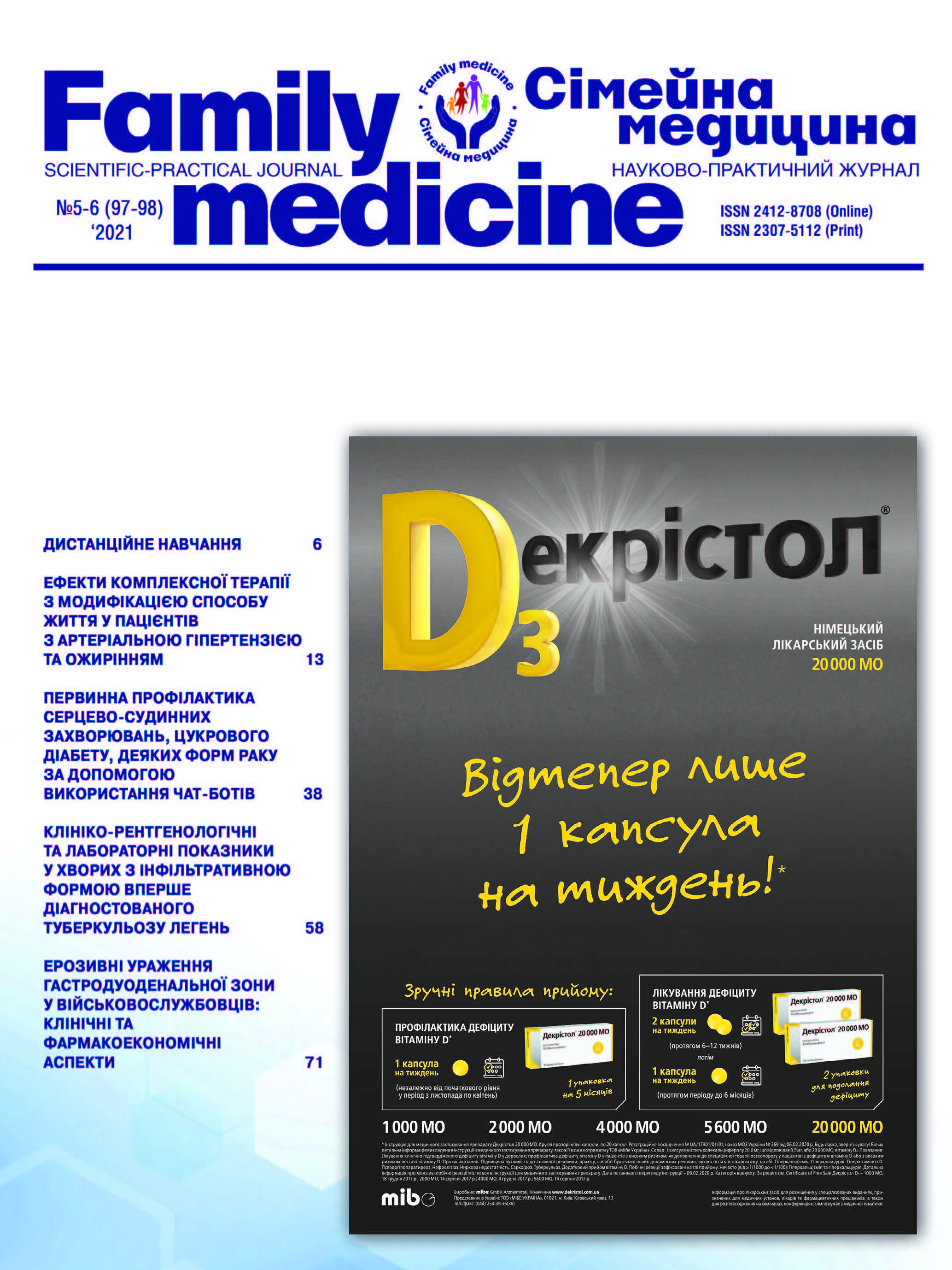Comorbidity in Servicemen – Participants of Modern Military Conflicts
##plugins.themes.bootstrap3.article.main##
Abstract
The professional health of a serviceman is the absence of diseases in the presence of a certain level of compensatory and protective mechanisms that ensure high combat effectiveness in the conditions of his professional activity. That is why the most important component of the national security system of our country is the protection and strengthening of the health of military personnel.
In recent years, armed conflict has continued in the east of Ukraine. Therefore, today’s urgent task is to study the features of comorbid diseases that may be primary to modern combat trauma in military personnel participating in the anti-terrorist operation / Joint Forces Operation (ATO / JFO). Comorbid diseases have a negative impact on the course of modern combat trauma, as well as combat trauma has a negative impact on the course of these diseases.
The objective: to analyze the frequency of comorbid diseases in military personnel – participants in the ATO / JFO, depending on the presence of a closed craniocerebral injury (CTBI).
Materials and methods. The study was performed in the Ukrainian Military Medical Academy based on the National Military Medical Clinical Center “Main Military Clinical Hospital” where 183 servicemen – participants of the ATO / JFO with arterial hypertension (AH) were examined. Patients were divided into two statistically homogeneous groups according to age: group I – 127 people who, while participating in the ATO / JFO, did not receive CTBI, group II – 56 people with such injury. Statistical analysis of the results was done by use of the standard statistical package STATISTICA 10.0 for Windows from StatSofr Inc. (USA) using parametric statistical methods.
Results. In military personnel participating in the ATO/JFO, there was no correlation between the severity of hypertension and the presence of a cranio-cerebral injury. At the same time, in subjects with CTBI, there was an increase in the frequency of comorbid diseases of the nervous system and diseases of the ear and mammillary process and a decrease in the frequency of comorbid endocrine and metabolic diseases and diseases of the genitourinary system compared to patients without such an injury.
Patients with CTBI have an increase in the frequency of acubarotrauma and sensorineural hearing loss and a decrease in the frequency of urolithiasis compared with military personnel without CTBI.
Conclusions. The study established the features of comorbid diseases in military personnel – participants in modern military conflicts, depending on the presence of a closed craniocerebral injury. This information is important for the further medical and social rehabilitation and development of proper functional-organizational model of secondary prevention of this comorbid pathology in order to prolong the professional longevity of highly professional military personnel. It is necessary to study further the influence of organic (traumatic) brain lesions over time on the morphogenesis of arterial hypertension and comorbid diseases, and their combination in military personnel participating in the ATO/JFO.
##plugins.themes.bootstrap3.article.details##

This work is licensed under a Creative Commons Attribution 4.0 International License.
Authors retain the copyright and grant the journal the first publication of original scientific articles under the Creative Commons Attribution 4.0 International License, which allows others to distribute work with acknowledgment of authorship and first publication in this journal.
References
Bibik TA, Guzhvenko DV, Agrepyshyn SV Analysis of medical care for servicemen – participants in hostilities in the outpatient clinic of the National Military Medical Clinical Center «Main Military Clinical Hospital». Modern aspects of military medicine: collection. Science. Proceedings of the National Military Medical Clinical Center «GVKG» and the Ukrainian Military Medical Academy. 2020;27 (1):3-12.
Buzhenko AI Comorbidity in patients with hypertension of men of mobilization age and servicemen: prevalence and course: dis. … сand. med. Science: 14.01.02. Kyiv, 2017. 158 p.
Military field therapy: a textbook / GV Osyodlo [etc.]; ed. A.V. Willow; Ukr. Military medical acad. Ministry of Defense of Ukraine, Military Medical department. Kyiv: Chalchynska NV, 2017. 620 p.
Military field surgery: a textbook / Ya.L. Zarutsky, [etc.]; for order. Ya.L. Zarutsky, V.M. Zaporozhyan. Odessa: ONMedU, 2016. 416 p.
Zhakhovsky VO, Livinsky VG, Kudrenko MV, Slabky GO Functioning of the Medical Forces of the Armed Forces of Ukraine in terms of reforming the health care system in Ukraine. Ukraine. The health of the nation. 2020;4(62):24-33.
Kazmirchuk AP, Myasnikov GV, Sidorova NN, Sidorova LL Pathology of internal organs in combat trauma. Register of victims in the area of the antiterrorist operation. Modern aspects of military medicine: collection. Science. Proceedings of the National Military Medical Clinical Center «GVKG». 2014;21:44-9.
Savitsky VL, Todurov IM, Yakimets VM, Pechiborsch VP, Merchant VE, Pechiborsch OV, Yakimets VV A single medical space in today’s realities. Ukraine. The health of the nation. 2020;4(62):34-40.
Sidorova NM Secondary pathology of the cardiovascular system in servicemen with combat trauma is a modern view of the problem. Military medicine of Ukraine. 2018;1:43-53.
Trukhacheva NV Mathematical statistics in biomedical research using the Statistica package. Moscow: GEOTARMedia, 2012. 384 p.
Khomenko IP, Korol SO, Khalik SV, Shapovalov V.Yu., Enin RV, Gerasimenko OS, Tertyshny SV. Clinical and epidemiological analysis of the structure of combat surgery injuries during the anti-terrorist operation / Joint Forces operation in eastern Ukraine. Ukrainian Journal of Military Medicine. 2021;2(2):6-13.
Chernenko IO. Frequency and risk factors-anti-risk of alcoholism of servicemen of the Armed Forces of Ukraine participants in local hostilities. Bulletin of Marine Medicine. 2018;3:29-38.





